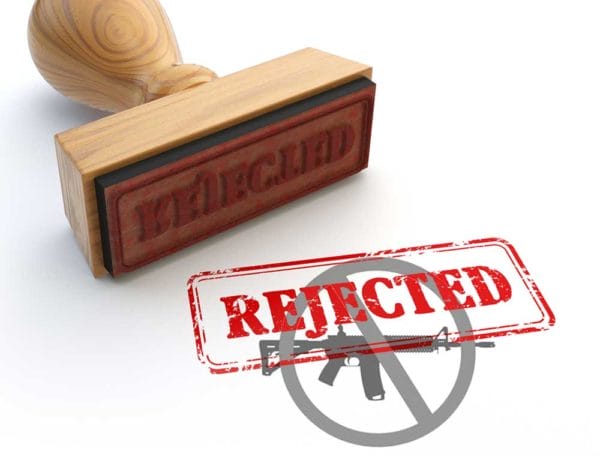
A Bureaucratic Trap with Real Consequences
Imagine serving your country honorably—never arrested, never convicted—yet finding out years later that the FBI lists you as a criminal. That’s the reality for thousands of veterans and service members caught in a shadowy military justice practice called “titling.”
Under this system, being named as a “subject” in a military investigation can place your name in federal criminal databases for up to 40 years, even if no crime was ever proven, no charges were filed, and no court ever found you guilty.
The fallout? Veterans lose jobs, clearances, housing—and, in many cases, their God-given Second Amendment rights!
How “Titling” Turns the Innocent Into Felons
The Defense Department’s rulebook, DoD Instruction 5505.07, requires investigators to “title” anyone for whom there is credible information that they might have committed an offense.
“Credible information” isn’t evidence—it can be little more than an allegation.
Once titled, your name is indexed into the Defense Central Index of Investigations (DCII) and shared with the FBI’s National Crime Information Center (NCIC). These systems flag you like an arrest record, and that flag can appear in background checks—including those used for firearm purchases.
Former Army prosecutor Frank Rosenblatt calls the threshold for titling “a very low standard, far below the standard required at trial.” It’s an administrative act, not a legal finding—but one that carries the weight of a conviction in civilian life.
Real People, Real Damage
Texas National Guard member Denise Rosales learned about “titling” the hard way. While deployed in Kuwait, she hosted a small party where someone allegedly brought alcohol—illegal under local law. The Army investigated but never charged her. Still, she was fingerprinted, titled, and effectively branded a criminal.
Years later, Rosales lost her National Guard job, was barred from chaperoning her kids’ school trips, and flagged during background checks.
“Who will take my word over the plain text of the FBI’s criminal history?” she asked in court filings.
In another case, former Green Beret James Morris discovered he’d been listed as a violent offender—accused of “murder” and “attempted aggravated sexual contact”—even though he was never charged or detained.
His supposed “arrest record” surfaced only when he tried to renew his concealed carry permit.
The Second Amendment Fallout
Because FBI and military databases share data, titling can block lawful gun ownership. Veterans with spotless legal records find themselves denied firearm purchases under the federal background check system.
“It’s the digital equivalent of a scarlet letter,” said attorney Doug O’Connell, a retired Special Forces colonel now representing Rosales. “They’ve created a system where you’re guilty until proven innocent—and that’s not how America is supposed to work” .
Once entered, a titling record can remain for decades, and expungement is “nearly impossible,” according to Army legal guidance. Even an acquittal in military court doesn’t erase it.
The result: service members who risked their lives for our Country protecting the Constitution are now treated like felons—barred from exercising the very rights they swore to defend.
Congressional Push for Reform
Some lawmakers are finally taking notice. Rep. Eli Crane (R-AZ), a former Navy SEAL, has introduced legislation requiring the deletion of titling records after 10 years if no charges are ever filed. “Far too often, the reputation of our brave service members is unfairly tarnished due to titling,” Crane said, calling it a “sensible approach to protecting livelihoods and liberty”.
Last month, I introduced an amendment to the House-passed NDAA to reform the broken titling process.
This is a sensible step toward protecting our troops from unjust reputational harm.https://t.co/nEN0sAew2T
— Rep. Eli Crane (@RepEliCrane) October 23, 2025
Under a 2021 National Defense Authorization Act provision, veterans can now request expungement—but only if they prove that “probable cause did not or does not exist.” That’s still a high bar, and few succeed.
A Fight for Freedom and Fairness
Critics call the practice a constitutional crisis hiding in military bureaucracy—a silent rights violation affecting an estimated 10,000 or more veterans.
As Rosales’s lawsuit continues, federal judges have expressed confusion about why the Army refuses to correct false records. “I don’t understand why they don’t just remove it,” one judge said during hearings.
For pro-gun Americans, the issue strikes at the heart of liberty. If the government can brand loyal soldiers as criminals without trial—and use that to strip away their right to bear arms—it sets a dangerous precedent.
As one veteran advocate put it: “Our troops shouldn’t have to fight their own government just to clear their names and keep their constitutional rights intact.”
In plain terms: The same system meant to track military wrongdoing is now wronging the very people it was built to protect. Until Congress or the courts force reform, many of America’s defenders remain on the wrong side of a database—and the wrong side of their own Constitution.
Rosales v. Army Class-Action-Complaint
Sources:
- The War Horse investigative report (Oct. 2025)
- DoD Instruction 5505.07 (Aug. 2023)
- Fort Leonard Wood Legal Assistance Office guidance
- Army Lawyer publication
- Rosales v. Army class-action complaint






Usually you can’t fix stupid but this needs to be given a shot at it.
I wonder if Hegseth knows?
Many moons ago and in a land far away I attended the Department of the Navy’s Senior Officer Legal seminar in Newport, RI. The purpose of the course was to give commanders first hand instruction in military justice from the perspective of leaders enforcing and maintaining good order and discipline as well as good morale. Military Law (UCMJ) is one tool available to a commander to fulfill the goals of good order and discipline as well as good morale. All are critical components of combat efficiency. One of the lecturers was a Navy JAG Captain who addressed the issues of… Read more »
All of the down sides of a conviction, without being convicted. This sounds like more Fat Boy Institute overreach.
this is absolutely wrong. The time period shouldn’t be reduced to ten years, this practice needs to be banned altogether. If there is enough evidence then seek an indictment or charge the individual and resolve this in court. Guilty gets you on the list, not guilty prevents you from going onto the list for that set of events.
I support only a bill that would remove anyone from this database that was not found guilty. To make it where the non=offence remains intact for only ten years, based on an allegation is bullshit. It’s like requiring a gun permit to carry concealed making your right into a privilege. How you ask? It’s bullshit too and only the smell is different! As for the woman who was busted for alcohol, she is a US citizen and should not be held accountable to the rules or standard of the country she is fighting in. She is there to change that… Read more »
Who else just learned of this treason against the constitution for the first time?
So Trump could fix this instantly with an executive order
And yet they couldn’t manage to get Devin Kelley into the system despite; Kelley was brought before a general court-martial on four charges: assault on his wife, aggravated assault on his stepson, two charges of pointing a loaded gun at his wife, and two counts of threatening his wife with an unloaded gun. In November 2012, Kelley pleaded guilty to two counts of Article 128 UCMJ, for the assault of his wife and stepson. In return, the weapons charges were dropped.[47][48][49] He was sentenced to 12 months of confinement and a reduction in rank to airman basic. He appealed to the U.S. Court of Appeals for the Armed… Read more »
DoD and UCMJ unfairly screwing over service members? Never happens [sarcasm]. In any other form of criminal law, it’s on the state to prove probable cause exists. Only under UCMJ is it on the SM to prove they didn’t do it. One must prove their innocence and that can be a difficult hill to overcome when the assumption of guilt is already set. It’s a horrible injustice and smear not only on the people that serve but on the branches themselves. The next NDAA should include a requirement that this lazy, purposeless practice be eliminated if the service branches want… Read more »